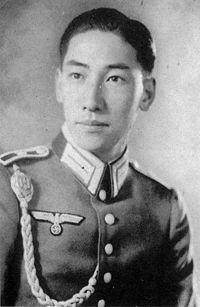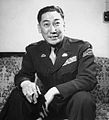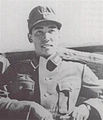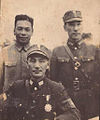- Chiang Wei-kuo
-
Chiang Wei-kuo (蔣緯國) 
Chiang Wei-kuo as an officer candidate in the Wehrmacht. The shoulder boards indicate the rank of Fahnenjunker.Born October 6, 1916
Tokyo, JapanDied September 22, 1997 (aged 80)
Taipei, Republic of ChinaPlace of burial Wuzhi Mountain Military Cemetery Allegiance  Republic of China
Republic of China
 Nazi Germany
Nazi GermanyYears of service (Wehrmacht) 1936-1939
(ROC) 1936, 1939-1997Rank (Wehrmacht) Lieutenant
(ROC) GeneralUnit (ROC) First Armored Regiment Commands held (ROC) Commander-in-Chief of armored units Battles/wars (Wehrmacht) Anschluss
(ROC) Second Sino-Japanese War, Chinese Civil WarAwards (Wehrmacht) Gebirgsjäger Edelweiss sleeve insignia
(ROC) Order of Blue Sky and White SunChiang Wei-kuo (simplified Chinese: 蒋纬国; traditional Chinese: 蔣緯國; pinyin: Jiǎng Wěiguó, or Wego Chiang; October 6, 1916 – September 22, 1997) was an adopted son of President Chiang Kai-shek, adoptive brother of President Chiang Ching-kuo, and an important figure in the Kuomintang (KMT). His courtesy names were Jianhao (建鎬) and Niantang (念堂).
Contents
Early life
As one of two sons of Chiang Kai-shek, Chiang Wei-kuo's name has a particular meaning as intended by his father. "Wei" literally means "parallel (of latitude)" while "kuo" means "nation"; in his brother's name, "Ching" literally means "longitude". The names are inspired by the references in Chinese classics such as the Guoyu, in which "to draw the longitudes and latitudes of the world" is used as a metaphor for a person with great abilities, especially in managing a country.
Born in Tokyo when Chiang Kai-shek and the KMT were exiled to Japan by the Beiyang Government, Chiang Wei-kuo has long been speculated to be an offspring of Tai Chi-tao and a Japanese woman, Shigematsu Kaneko (重松金子).[1][2] Chiang Wei-kuo previously discredited any such claims and insisted he was a legitimate son of Chiang Kai-shek until his later years (1988), when he admitted that he was adopted.[3]
According to popular gossip, Tai believed knowledge of his Japanese tryst would destroy his marriage and his career, so he entrusted Wei-kuo to Chiang Kai-shek, after the Japanese Yamada Juntaro (山田純太郎) brought the infant to Shanghai.[1] Yao Yecheng (姚冶誠), Chiang's wife at the time, raised Wei-kuo as her own. The boy called Tai his "Dear Uncle" (親伯).
Chiang moved to the Chiang ancestral home in Xikou Town of Fenghua in 1910. Wei-kuo later studied Economics at Soochow University.
In the Wehrmacht
With his sibling Chiang Ching-kuo being held as a virtual political hostage in the Soviet Union by Joseph Stalin having prior been a student studying in Moscow, Chiang sent Wei-kuo to Germany for a military education at the Munich Military Academy (Kriegshochschule). Here, he would learn the most up to date German military tactical doctrines, organization, and use of weaponry on the modern battlefield such as the German-inspired theory of the Maschinengewehr (Medium machine gun, at this time, the MG-34) led squad, incorporation of Air and Armored branches into infantry attack, etc. After completing this training, Wei-kuo completed specialized Alpine warfare training, thus earning him the coveted Gebirgsjäger (The elite Wehrmacht Mountain Troop) Edelweiss sleeve insignia. This was not an easy accomplishment, as part of the training selection included carrying 30 kilos of ruck sack through the Bavarian Alps. Wei-kuo was promoted to Unteroffizier (also known as Fahnenjunker, or Officer Candidate) and was evidently a fine marksman, as his pictures depict him wearing the Schützenschnur lanyard.
Wei-kuo commanded a Panzer unit during the 1938 Austrian Anschluss as a sergeant officer-candidate,[4] leading a tank into that country; subsequently, he was promoted to Lieutenant of a Panzer unit awaiting to be sent into Poland. Before he was given the mobilization order, he was recalled to China.
Service during the Second Sino-Japanese War
Upon being recalled from Germany, Chiang Wei-kuo formally took part in the National Revolutionary Army. There, Wei-kuo became a Major at 28, a Lieutenant Colonel at 29, a Colonel at 32, and later, a Major General. Chiang Wei-kuo was stationed at a garrison in Xi'an in 1941.
Service during the Chinese Civil War
During the Chinese Civil War, Chiang Wei-kuo employed tactics he had learned whilst studying in the German Wehrmacht. He was in charge of a M4 Sherman tank battalion during the Huaihai Campaign against Mao Zedong's troops, scoring some early victories.[5] Meanwhile, in 1949 he moved his tank regiment to Taiwan after the nationalist defeat in Chinese Civil War.
Relocation to Taiwan
Chiang Wei-kuo continued to hold senior positions in the Republic of China Armed Forces following the ROC retreat to Taiwan. Following the Hukou Incident in 1964, Chiang Wei-kuo was punished as he was connected to Chao Chih-hwa, a subordinate of Wei-kuo who attempted a Coup d'état, and never held any real authority in the military again.[6][7][8]
From 1964 onwards, Chiang Wei-kuo made preparations in establishing a school dedicated in teaching warfare strategy; such a school was established in 1969. In 1975, Chiang Wei-kuo was further promoted to the position of general, and served as president of the Armed Forces University. In 1980, Chiang served as joint logistics commander in chief; then in 1986, he retired from the army, and became National Security Council Secretary-General.
In 1993, Chiang Wei-kuo was employed as the advisor of the president of the Republic of China.
Political career
His positions in the Republic of China government included:
- Commanding general of the armored vehicles regiment (甲兵司令)
- Commanding general of the unified logistics division (聯勤總司令)
- Commandant of the Army Strategies College (陸軍指揮參謀大學)
- Chancellor of the Three-Military University (三軍大學校長)
- Senior advisor to the President (總統府資政)
- Secretary-General, Council of National Security (國安會秘書長)
- Minister for National Defense (from 1965 to 1969)
After Chiang Ching-kuo's death, Chiang was a political rival of native Taiwanese Lee Teng-hui, and he strongly opposed Lee's Taiwan localization movement. Chiang ran as vice-president with Taiwan Governor Lin Yang-kang in the 1990 ROC indirect presidential election. Lee ran as the KMT presidential candidate and defeated the Lin-Chiang ticket.[9][10][11][12]
In 1991, Chiang's housemaid, Li Hung-mei (李洪美, or 李嫂) was found dead in Chiang's estate in the Taipei City. The following police investigation discovered a stockpile of sixty guns on Chiang's estate. Chiang himself admitted the possibility of a link between the guns and his maid's death, which was later ruled a suicide by the police.[13] The incident permanently tarnished Chiang Wei-kuo's name, at a time when the Chiang family was increasingly unpopular on Taiwan and even within the Nationalist Party. A new generation of Nationalists no longer had the will or desire to cover the decades of corruption and scandal that the Chiang family had surrounded itself ever since Chiang Kai-shek rose to power in the 1930s.
Personal life
In 1944, he married Shih Chin-i (石靜宜), the daughter of Shih Feng-hsiang (石鳳翔), a textile tycoon from North West China. Shih died in 1953 during child birth. Wei-kuo later established the Jinsin Elementary School (靜心小學) in Taipei to commemorate his late wife.
In 1957, Chiang re-married, to Chiu Ju-hsüeh (丘如雪), also known as Chiu Ai-lun (邱愛倫), a daughter of Chinese and German parents. Chiu gave birth to Chiang's only son, Chiang Hsiao-kang, (蔣孝剛) in 1962. Chiang Hsiao-kang is the youngest of the Hsiao generation of the Chiang family.
Chiang Wei-kuo was also quite active in civilian society, where he was the founder of the Chinese Institute of Strategy and Sino-German Cultural and Economic Association, as well as the Chairman of the Republic of China Football Association. He was the first chairman of Jingxin Primary School (靜心小學), and served as the president of the United States Students Association of China.
Final years
In the early 1990s, Chiang Wei-kuo established an 11-person unofficial Spirit Relocation Committee (奉安移靈小組) to petition the Communist government to allow his father and brother to be interred in mainland China (neither had been interred after their deaths in Taiwan, but rather placed in converted mausoleums awaiting a future burial on the mainland).[13] His request was largely ignored by both the Nationalist and Communist governments, and he was persuaded to abandon the petition by his stepmother and his father's widow, Soong May-ling in November 1996.
In 1994, a hospital was supposed to be named after him (蔣緯國醫療中心) in Sanchih, Taipei County (now New Taipei City), after an unnamed politician donated to Ruentex Financial Group (潤泰企業集團), whose founder was from Sanchih. Politicians questioned the motivation.[13]
In 1996, the Chiang home on military land was finally demolished by the order of the Taipei municipal government under Chen Shui-bian. The estate had been constructed in 1971. After Chiang moved elsewhere in 1981, he deeded it to his son. The justification was that son was not in military service and thus was not entitled to live there.[14]
Chiang Wei-kuo died at the age of 80 from kidney failure. He had been experiencing falling blood pressure complicated by diabetes after a 10-month stay at Veteran's General Hospital, Taipei. He wished to be buried in Suzhou in mainland China, but was instead buried at Wuchih Mountain Military Cemetery.
Personal details
Education history
- Department of Physics, Soochow University
- Tenth Central Military Academy
- Munich Academy (1938)
- U.S. Army Air Force Air Combat Tactical School (1940)
- U.S. Armor School in India (1943)
- Round Mountain High Class trained officer corps (1951)
- U.S. Army Command and Staff College formal training classes (1953)
- School of Social Practice Class III combat training (1955)
- Practical Advanced Military Studies Research Society training classes (1963)
Military, civil and government positions held
Military, civil and government positions held- National Revolutionary Army officer Lieutenant attendant (1936)
- German Seventh Army trainee (In November 1936 -1937)
- German Army Mountain Division soldiers, 98th Regiment, 2nd Battalion, 5th Company (November 1937-1938)
- German Army Mountain Division soldiers eighth lieutenant (1938–1939)
- NRA First Division Army 3rd Regiment, 2nd Battalion, 5th Company platoon leader (1941)
- NRA First Division Army 3rd Regiment, 2nd Battalion, 5th Company Commander (1941)
- NRA First Division Army 3rd Regiment, 2nd Battalion deputy battalion commander (1942–1944)
- NRA First Division Army 3rd Regiment, 2nd Battalion battalion commander (1944–1945)
- Youth Expedition 206 Division, 616 Battalion, 2nd Regiment (1945)
- Third Department of the Army armored corps training Director (1945)
- Army Corps armored fighting vehicles training, fourth regiment group leader (1945–1946)
- Army Corps armored fighting vehicles training, first regiment group leader (1946–1947)
- Army Corps armored fighting vehicles training, first regiment commander (1947-?)
- Nanjing Private Secondary School in Yining founder (1948)
- Armored Force Command Chief of Staff (1948–1949)
- Armored Force Command deputy commander (1949 - 1 March 1950)
- Armored brigade (1st term) Brigadier (March 1, 1950 - June 1, 1953)
- Yi Ning, chairman of private secondary school, Taichung City (November 1951 - June 1953)
- Jingxin Primary School chairman (1956–1968)
- Fifth Department of Defense Director of the Office (1958 - ?)
- Armored Force Command (4th term) Commander (August 1, 1958 - August 1, 1963)
- Department of Defense senior staff
- Defense Planning Committee, deputy director of joint operations
- Dean of the Army Command and Staff College (September 1, 1963 - September 1, 1968)
- Sino-German Cultural and Economic Association (1963–1986)
- Armed Forces University Vice-Chancellor (1968 - 16 August 1975)
- Armed Forces War College University of Institutionalized Persons (December 1, 1969)
- Armed Forces University, Dean of war (December 1, 1969 - April 7, 1980)
- Armed Forces University President (August 16, 1975 - April 7, 1980)
- Central Consultative Committee of the Kuomintang (1976 - ?)
- Founder of the Chinese Institute of Strategy (1979)
- Taipei Football Association (April 29, 1980 -March 25, 1982)
- Chief of the General Command of the Joint Duty (April 7, 1980 - July 1984)
- Meihua Sports Promotion Campaign Committee vice chairman (1980 - 22 September 1997)
- Joint Operations Training Officer (July 1, 1984 - June 18, 1986)
- National Security Council Secretary-General (June 18, 1986 - February 28, 1993)
- Bureau of the Kuomintang Chairman of the Central Consultative Committee (1988 - ?)
- Chairman of the Chinese Institute of Strategy (1990 -?)
- National Unity Committee
- Presidential advisor (February 28, 1993 - September 22, 1997)
- Rotary Club of Taipei
Written works
- Grand Strategy Summary 《大戰略概說》
- A Summary of National Strategy 《國家戰略概說》
- The strategic value of Taiwan in the world 《臺灣在世局中的戰略價值》 (1977)
- The Middle Way and Life 《中道與人生》 (1979)
- Soft military offensive 《柔性攻勢》
- The basic principles of the military system 《軍制基本原理》 (1974)
- The Z that creates this age 《創造這個時代的Z》
Gallery
-
Chiang Wei-kuo in the National Revolutionary Army in 1941, as a second lieutenant stationed in Xi'an.
-
Chiang Wei-kuo as Lieutenant General of the Republic of China Armed Forces. c. 1965—1969
Footnotes
- ^ a b 2009年08月02日, 人民網, 蔣介石、宋美齡的感情危機與蔣緯國的身世之謎, 新華網(港澳臺)
- ^ 蔣緯國的親媽——重松金子, 鳳凰網
- ^ Sep 23, 1997, Last son of Chiang Kai-shek dies, China Informed
- ^ Laura Tyson Li (2007). Madame Chiang Kai-Shek: China's Eternal First Lady (reprint, illustrated ed.). Grove Press. p. 148. ISBN 0802143229. http://books.google.com/books?id=FRY0v7AH2ngC&pg=PA148&lpg=PA148&dq=h+h+kung+hitler&source=bl&ots=4_9e6yO6vT&sig=_2IqNEAzXn8_eXdVgadVZzUuLWI&hl=en&ei=OBbYTZO9GqLx0gGs2Mn8Aw&sa=X&oi=book_result&ct=result&resnum=9&ved=0CEQQ6AEwCDge#v=onepage&q=wego%20ambassador%20anschluss&f=false. Retrieved 2011-05-21.
- ^ Dr. Gary J. Bjorge, (2004). Moving the Enemy: Operational Art in the Chinese PLA’s Huai Hai Campaign. Leavenworth Paper, No.22. Combat Studies Institute Press, Fort Leavenworth, Kansas.
- ^ 薛化元 (in zh-tw). 湖口兵變. 台灣: 國家文化資料庫. http://nrch.cca.gov.tw/ccahome/website/site20/PDFFiles/0891.pdf. Retrieved 2011-01-22引用.
- ^ "將軍悲翻案/湖口兵變 蔣緯國受牽連被打入冷宮" (in zh-tw). NOWnews. 2007-11-10. http://www.nownews.com/2007/11/10/10844-2185201.htm. Retrieved 2011-01-22查閱.
- ^ "湖口兵變" (in zh-tw). 台灣大百科全書. http://taiwanpedia.culture.tw/web/content?ID=5719. Retrieved 2011-01-22檢索.
- ^ 張昆山, 1990/03/10, 林洋港:婉辭國代連署提名, 台北報導
- ^ 2010年08月25日, 李登輝如何搞垮了國民黨, 新華網(港澳臺)
- ^ 07/22/2003, 四、利用“三月政爭”打破聯合掌權, 華夏經緯網
- ^ "總統"的弟弟, 鳳凰網
- ^ a b c 王利南 (2000年 第十五期) (in zh). 蔣緯國的回歸夢(連載七). 人民日報. http://www.people.com.cn/BIG5/paper81/1324/205784.html. "第二場風波是蔣緯國藏槍事件,1991年7月6日蔣緯國第二次競選失敗時,台中市警署公布了所謂蔣緯國家中藏有60只靶槍的事情,同時發生了蔣緯國家中一個叫李洪美的女佣神秘死去的案件。蔣緯國公開發表講話認為女佣人神秘死去可能和槍支告發者有關,可能受到威脅后自殺。其實這批靶槍放在家里已經20多年了,也早已成了廢鐵,他早就忘了。所謂李嫂告發事件,因為李嫂神秘死去無法對証,所以很可能是個設計好的陰謀。"
- ^ 2005-04-20, 蔣緯國批評“台獨”的親筆信在重慶露面(組圖), 重慶晨報
Bibliography
- Wang Shichun (汪士淳), (1996). Travelling alone for a thousand mountains: The Life of Chiang Wei-kuo (千山獨行 蔣緯國的人生之旅), Tianxia Publishing, Taiwan. ISBN 957-621-338-x
- Zhou Shao (周劭). The trifles of Chiang Wei-kuo's youth (青年蔣緯國瑣事), within the volume "Huanghun Xiaopin" (黃昏小品), Shanghai Guji Publishing House (上海古籍出版社), Shanghai, 1995. ISBN 7532512355
- KWAN Kwok Huen (關國煊). Biography of Chiang Wei-kuo (蔣緯國小傳). Biography Literature (傳記文學), 78, 4.
See also
- Sino-German cooperation
- History of the Republic of China
- Military of the Republic of China
Categories:- Chinese people of Japanese descent
- Chiang Kai-shek family
- German military personnel of World War II
- People from Ningbo (hometown)
- Politicians of Japanese descent
- Republic of China Army generals
- Senior Advisors to President Lee Teng-hui
- Taiwanese people of Japanese descent
- 1916 births
- 1997 deaths
- People from Tokyo
- People of the Chinese Civil War
- People of the Second Sino-Japanese War
Wikimedia Foundation. 2010.









